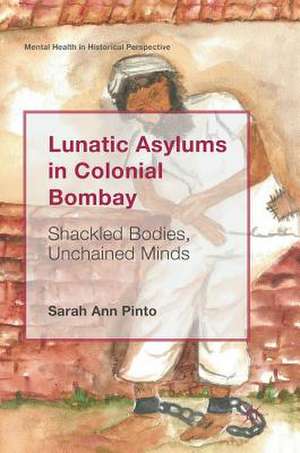Lunatic Asylums in Colonial Bombay: Shackled Bodies, Unchained Minds: Mental Health in Historical Perspective
Autor Sarah Ann Pintoen Limba Engleză Hardback – 10 sep 2018
Toate formatele și edițiile
| Toate formatele și edițiile | Preț | Express |
|---|---|---|
| Paperback (1) | 383.93 lei 6-8 săpt. | |
| Springer International Publishing – 28 dec 2018 | 383.93 lei 6-8 săpt. | |
| Hardback (1) | 504.99 lei 6-8 săpt. | |
| Springer International Publishing – 10 sep 2018 | 504.99 lei 6-8 săpt. |
Din seria Mental Health in Historical Perspective
-
 Preț: 282.24 lei
Preț: 282.24 lei - 17%
 Preț: 364.29 lei
Preț: 364.29 lei -
 Preț: 202.93 lei
Preț: 202.93 lei -
 Preț: 148.04 lei
Preț: 148.04 lei -
 Preț: 458.78 lei
Preț: 458.78 lei - 15%
 Preț: 640.24 lei
Preț: 640.24 lei - 18%
 Preț: 727.66 lei
Preț: 727.66 lei -
 Preț: 226.07 lei
Preț: 226.07 lei -
 Preț: 346.86 lei
Preț: 346.86 lei - 15%
 Preț: 523.54 lei
Preț: 523.54 lei -
 Preț: 213.97 lei
Preț: 213.97 lei - 18%
 Preț: 787.47 lei
Preț: 787.47 lei - 15%
 Preț: 446.60 lei
Preț: 446.60 lei - 18%
 Preț: 889.75 lei
Preț: 889.75 lei - 15%
 Preț: 524.22 lei
Preț: 524.22 lei - 18%
 Preț: 786.18 lei
Preț: 786.18 lei -
 Preț: 233.40 lei
Preț: 233.40 lei -
 Preț: 417.90 lei
Preț: 417.90 lei - 15%
 Preț: 701.40 lei
Preț: 701.40 lei - 15%
 Preț: 523.72 lei
Preț: 523.72 lei - 18%
 Preț: 894.34 lei
Preț: 894.34 lei - 15%
 Preț: 640.24 lei
Preț: 640.24 lei - 15%
 Preț: 706.30 lei
Preț: 706.30 lei - 15%
 Preț: 576.21 lei
Preț: 576.21 lei - 5%
 Preț: 158.80 lei
Preț: 158.80 lei -
 Preț: 319.98 lei
Preț: 319.98 lei -
 Preț: 227.42 lei
Preț: 227.42 lei
Preț: 504.99 lei
Preț vechi: 594.10 lei
-15% Nou
Puncte Express: 757
Preț estimativ în valută:
96.63€ • 101.25$ • 79.88£
96.63€ • 101.25$ • 79.88£
Carte tipărită la comandă
Livrare economică 11-25 aprilie
Preluare comenzi: 021 569.72.76
Specificații
ISBN-13: 9783319942438
ISBN-10: 3319942433
Pagini: 270
Ilustrații: XVII, 242 p. 28 illus. in color.
Dimensiuni: 148 x 210 mm
Greutate: 0.58 kg
Ediția:1st ed. 2018
Editura: Springer International Publishing
Colecția Palgrave Macmillan
Seria Mental Health in Historical Perspective
Locul publicării:Cham, Switzerland
ISBN-10: 3319942433
Pagini: 270
Ilustrații: XVII, 242 p. 28 illus. in color.
Dimensiuni: 148 x 210 mm
Greutate: 0.58 kg
Ediția:1st ed. 2018
Editura: Springer International Publishing
Colecția Palgrave Macmillan
Seria Mental Health in Historical Perspective
Locul publicării:Cham, Switzerland
Cuprins
1 Introduction.- 2 Indian Insanity and the Local-Colonial Contest for its Treatment.- 3 The Asylum as ‘Middle Ground’: Contestations and Negotiations.- 4 The ‘Common Sense’ Treatment of Indian Insanity.- 5 Unsound Soundscapes: Shrieks, Shouts and Songs.- 6 Public Perceptions of the Pagal Khana.- 7 Conclusion: Shackled Bodies, Unchained Minds.
Recenzii
“Sarah Pinto’s book is one of the first attempts to study the social history of lunatic asylums in the Bombay Presidency, and she approaches her study through an analysis of Indigenous responses to these colonial institutions. … the book will prove to be a fascinating read for anyone interested in the history of colonial health and healthcare. It is based on a vast body of primary sources available in India and the United Kingdom.” (Mrunmayee Satam, Journal of Colonialism and Colonial History, Vol. 20 (3), 2019)
Notă biografică
Sarah Ann Pinto completed her PhD in History from Victoria University of Wellington in 2017. Her awards include the ‘Bowen Prize for the Best Student in History, 2017', and the ‘Fr Henry Heras Prize, 2008’. Her passion for history and healing motivates her research. Through her work, she intends to enable new narratives in mental health treatment.
Textul de pe ultima copertă
This book traces the historical roots of the problems in India’s mental health care system. It accounts for indigenous experiences of the lunatic asylum in the Bombay Presidency (1793-1921). The book argues that the colonial lunatic asylum failed to assimilate into Indian society and therefore remained a failed colonial-medical enterprise. It begins by assessing the implications of lunatic asylums on indigenous knowledge and healing traditions. It then examines the lunatic asylum as a ‘middle-ground’ and the failure of superintendents to achieve hegemony. Thirdly, it discusses the European superintendents’ ‘common-sense’ treatment of Indian insanity. The book then assesses the soundscapes of Bombay’s asylums, and finally, it examines the extent to which public perceptions influenced the use of the asylum. Lunatic asylums left a legacy of historical trauma for the indigenous community because of their coercive and custodial character. This book aims to disrupt that legacy of trauma and to enable new narratives in mental health treatment in India.
Caracteristici
Takes the experience of Indian patients, families and local practitioners as the focus of this study, rather than psychiatry Traces the history of lunatic asylums in Bombay, drawing extensively on Indian and British archival sources Offers a new narrative of mental health treatment in India through its exploration of the historical traumas associated with these colonial institutions
